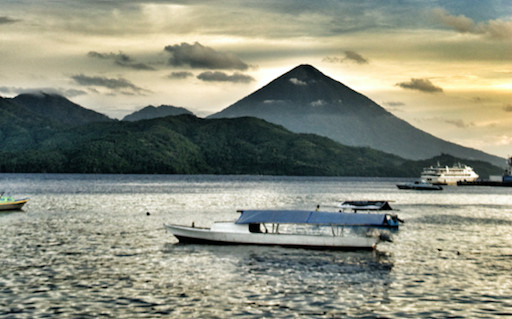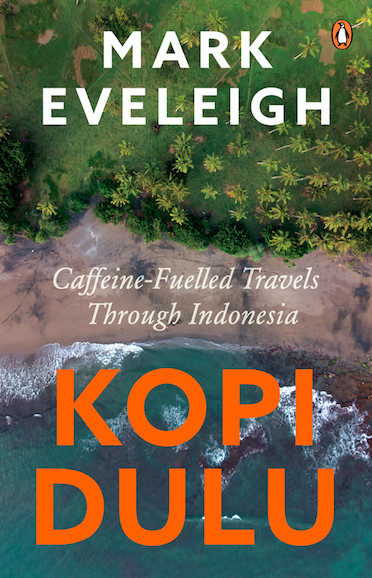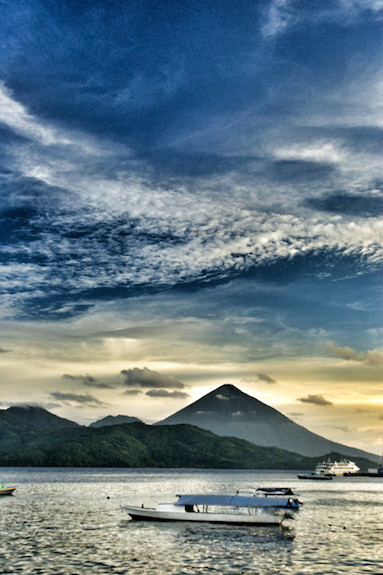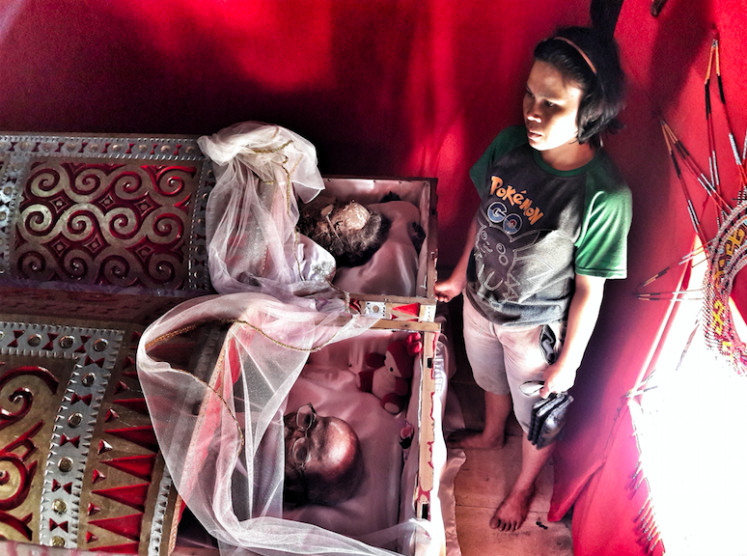Popular Reads
Top Results
Can't find what you're looking for?
View all search resultsPopular Reads
Top Results
Can't find what you're looking for?
View all search resultsChronicling Indonesia through its coffee
In a new book, British journalist Mark Eveleigh recounts his caffeine-fueled travels through Indonesia and the multifaceted insights he gained along the way.
Change text size
Gift Premium Articles
to Anyone
I
n a new book, British journalist Mark Eveleigh recounts his caffeine-fueled travels through Indonesia and the multifaceted insights he gained along the way.
As an old Indonesia hand, Mark Eveleigh might have thought that he could stomach the North Sulawesi region of Minahasa’s adage that its “people eat everything with four legs, apart from the table”, as his guide from the area, Elvis Pangemanan said.
“We eat a lot of things with less than four legs […] and many things with no legs at all,” Elvis had said.
Eveleigh recalled how Elvis invited him to tuck into the local specialty of flying fox bats. He said that his “heart hammered nervously”.
“[I was] disconcerted to see that the warung [food stall] menu featured dog curry along with […] babi hutan [jungle pig].”
Eveleigh asserted that the dish was not for the ages, as he found the rodent “had an unnervingly doglike muzzle”.
“The wings are said to be a real Minahasa delicacy, but the [culinary] experience was a lot like eating boiled garbage bags spiked with a sharpened chopstick,” Eveleigh recalls.
But first, coffee: Pictured is the cover of 'Kopi Dulu' book (roughly translates coffee first or let's have coffee), where author Mark Eveleigh shares his “travels through Indonesia for the past 25 years“. (Courtesy of Penguin Random House SEA/.)Laying out Indonesia, one coffee cup at a time
Eveleigh’s culinary adventures are among the anecdotes he recounts in Kopi Dulu, a travelogue of his journey across Indonesia. The book’s title comes from an Indonesian phrase meaning coffee first or let’s have coffee, a recurring theme that evoked the sociability of the people he met.
Eveleigh also intertwined the saying with the Indonesian way of taking one’s time or jam karet (rubber time) and pelan-pelan (taking things slow or slowing down), a phrase he translated as “slow-slow”.
“[Kopi Dulu] recounts my travels through Indonesia over the past 25 years. During that time, I managed to travel about 15,000 kilometers in 50 islands by sea and land,” Eveleigh said in a video interview.
“Aside from a catchphrase, Kopi Dulu is also a good way to break the ice with the people I meet.”
He added that much of his travels in Indonesia, along with parts of Africa, South America and the rest of Asia, was on assignment for newspapers and media outlets such as the BBC, CNN, the Telegraph, Guardian and Independent.
Eveleigh is taken by Indonesia’s size, which he noted was “of a similar distance from London to Khartoum, the capital of Sudan”, as well as its sheer diversity and relative obscurity for much of the international community.
“I once heard Indonesia described as the world’s most invisible country […] which has somewhere between 13,000 and 17,000 islands that sprawl across three time zones,” he wrote in the preface of Kopi Dulu.
Eveleigh also noted that Indonesia’s biodiversity was second to Brazil, though “almost a quarter of Indonesia’s 667 mammals are listed as ‘threatened’”.
The stats belied the real wonders of Indonesia for Eveleigh and other travelers to Indonesia, namely the country’s myriad of cultures, peoples and wildlife, an experience sweetened by innumerable cups of coffee.
Tropical idyll: A view of Ternate harbor, North Maluku. In his book titled 'Kopi Dulu', Mark Eveleigh recounts an incident in Ternate, North Maluku, during World War II where the locals turn the tables on the Japanese army. (Courtesy of Mark Eveleigh) (Courtesy of Mark Eveleigh/.)An Indonesian quest
Eveleigh’s sense of a quest in Kopi Dulu evoked the opening lines of Greek poet Constantine Cavafy’s poem Ithaca: “When you set out on your journey to Ithaca/ Pray that the road is long/ Full of adventure, full of knowledge.”
Eveleigh followed the trail taken by 19th-century British naturalist Alfred Wallace as he traced the faunal boundary between Asian and Australian species, and Eveleigh gives a firsthand observation of funeral rites in the South Sulawesi regency of Tana Toraja. There are also musings on Indonesia’s past in Jakarta’s historic Sunda Kelapa harbor.
Some passages, such as reaching out to orphaned orangutans in Bukit Lawang National Park, North Sumatra, during a trip to the area in 2003, are tender and touching, while an anecdote on wrestling monitor lizards and getting thrashed on the forehead by the reptile’s tail might amuse.
The lingering past: A Toraja resident visits her dead relatives. Eveleigh describes mourners at a Tana Toraja funeral as acting like “they are in a punk rock mosh-pit rather than a group of pallbearers as the barging, swaying gang of sweating, black-shirted youths tried to knock each other off their feet or wrench the bamboo poles away.” (Courtesy of Mark Eveleigh) (Courtesy of Mark Eveleigh/.)He describes mourners at a Tana Toraja funeral as acting like “they are in a punk rock mosh-pit rather than a group of pallbearers as the barging, swaying gang of sweating, black-shirted youths tried to knock each other off their feet or wrench the bamboo poles away.”
But Eveleigh noted that the method to their madness was “to disorientate and dislodge potentially dangerous spirits”.
Death is never far behind. This thinking is seen from flash floods from the Bohorok river killed more than 250 people at Bukit Lawang days after his stopover there or recounting surviving the capsizing of the Sinar Bulan in Kalimantan.
An encounter with an elderly western woman in Gorontalo, North Sulawesi, who saw her father executed by Japanese occupation forces during World War II, as well as the recounting of an incident in Ternate, North Maluku, during the same conflict where the locals turned the tables on the Japanese, revealed how the past was liable to resurface.
Despite the darker chapters of Indonesia’s history, Eveleigh believed the country had many ways to attract visitors, not least its people’s traditional hospitality.
“I feel safer in many Indonesian villages than I ever will in dozens of Western cities,” he said.
Yet he lamented the substantial challenges to experiencing the country’s full scope.
“The 30-day period for visa-free entry to Indonesia does not grant one enough time to intensively explore the country, not least its more out of the way parts,” Eveleigh said. “It is also difficult to pitch foreign magazine editors on Indonesia-related stories.”
Nonetheless, these challenges did not stop Eveleigh from uncovering Indonesia, especially islands such as Borneo, Flores and Sulawesi, before reaching the border between the Indonesian province of West Papua and Papua New Guinea. Like the travels he recounted, one can frame Kopi Dulu as a travelogue full of adventure or knowledge and a viable introduction to Indonesia’s vast unknown in Java and Sumatra.














